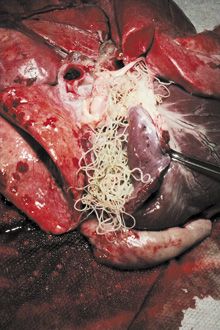CAPC urges yearly microfilariae testing in new heartworm guidelines
Parasitology group updates recommendations based on frequency of false negative antigen results.
The Companion Animal Parasite Council (CAPC) has modified its heartworm guidelines to recommend that veterinarians perform yearly microfilariae testing on all dogs, including those on heartworm prevention, in addition to an annual antigen test. The guidelines also include a recommendation to test all dogs living in high-risk areas twice a year.

New information presented at the American Association of Veterinary Parasitologists Conference in July showed that some dogs appear to develop immune complexes that block antigen detection via commercial tests, creating false negative results. Some parasitology specialists speculate that the practice of placing heartworm-infected dogs on a slow kill, long-term regimen of macrolytic lactone preventives and antibiotics instead of an approved adulticide may be the reason for the increase in these results.
“Dogs managed with these protocols may experience prolonged inflammation, which could result in the formation of immune complexes that mask detection of antigen on commercial tests,” says Susan Little, DVM, PhD, DACVM (parasitology), incoming president of the CAPC board. “In addition, the presence of persistent microfilaremia in dogs being managed with ‘slow kill' could contribute to selection for resistance.”
The new study revealed that more than 50 percent of dogs on a slow kill regimen were false negative on antigen tests. Researchers treated the samples with heat before testing, a practice that denatures the antigen-antibody complexes, allowing detection of the antigen. However, CAPC does not recommend routine heat treatment of samples prior to testing, as it destroys antibodies and could affect the test results of other agents, such as tick-borne infections.
CAPC recommends that heartworm-infected dogs be treated with labeled adulticide and microfilariae cleared as soon as medically possible. Also, if veterinarians encounter a patient that's clinically suspicious for heartworm disease or that lives in an endemic area but has negative antigen test results, they should consult a parasitologist or diagnostic laboratory for further guidance.
“The case for year-round heartworm prevention for pets should be built into a lifelong wellness and prevention program that also reduces the risk for gastrointestinal parasite infection,” says Dwight Bowman, MS, PhD, a CAPC board member. “CAPC encourages veterinarians to rely on their clinical skills in assessing pets for heartworm disease and to consider further diagnostics when encountering a negative antigen test result for suspicious cases.”
For more information on these and other parasite control and treatment guidelines, visit capcvet.org.
Podcast CE: A Surgeon’s Perspective on Current Trends for the Management of Osteoarthritis, Part 1
May 17th 2024David L. Dycus, DVM, MS, CCRP, DACVS joins Adam Christman, DVM, MBA, to discuss a proactive approach to the diagnosis of osteoarthritis and the best tools for general practice.
Listen